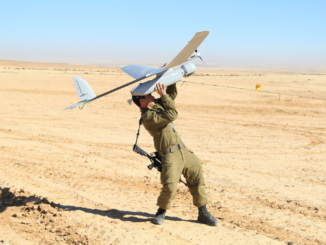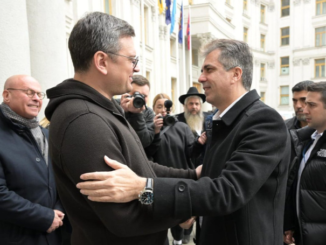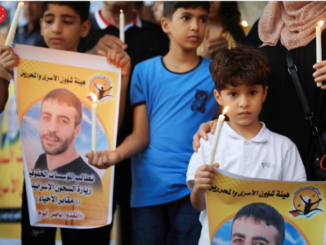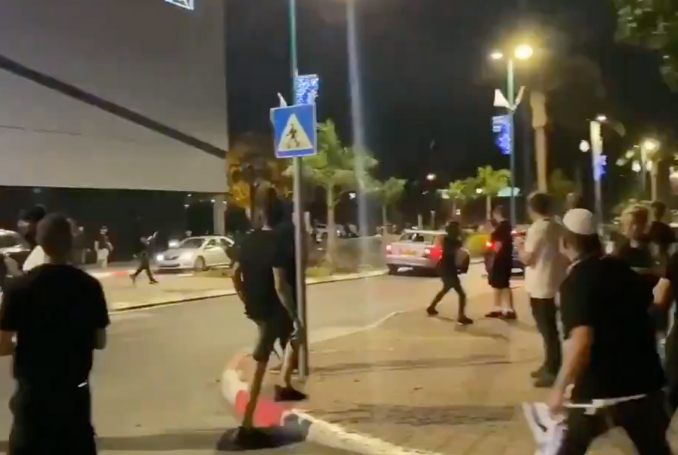
By Jeremy Salt
‘This is Kristallnacht,’ the mayor of Lod (Lydda), Yair Revivo, said after days of violence brought on by the storming of the Haram al-Sharif in Jerusalem by scores of Israeli occupation forces and the use of tear gas and stun grenades against Palestinians inside and outside the Aqsa mosque.
‘This is unthinkable,’ Revivo said of Lod. ‘Synagogues are being burned. Hundreds of cars set alight. Hundreds of Arab thugs are roaming the streets.’
Kristallnacht (Night of Broken Glass) refers to the night of November 9/10, 1938. A German diplomat had been assassinated by a Jewish teenager in Paris the day before. Let loose by the Nazi government, thugs ran wild through the streets of German cities, smashing, burning, killing, and vandalizing.
Close to 100 Jews were killed, hundreds of synagogues and schools, and thousands of businesses were destroyed and/or ransacked and Jewish graveyards vandalized. In the immediate aftermath, 35,000 Jewish males were sent to concentration camps.
In Lod on May 10/11, 2021, by comparison, according to the Israeli media, three synagogues, ‘numerous’ schools, and ‘dozens’ of cars were set on fire. A Jewish man was ‘hurt’ when a rock hit his car and another Jewish resident ‘seriously hurt.’ A Palestinian man and his daughter from the ‘unrecognized village’ of Dahmash died in a rocket strike from Gaza and a Palestinian was murdered by a Jewish man.
Self-defence was claimed but even the Israeli media noted that the man was shot from several meters away. The police and interior ministers insisted that his killer should be immediately released. Naftali Bennett, the former head of the West Bank settler council, Yesha, who is likely to be appointed Israel’s next prime minister, said the continued detention of the killer was an injustice.
So the death toll during ‘Lod’s night of broken glass over the two days was three Palestinian Muslims and no Israeli Jews. In fact, for a realistic Kristallnacht parallel to what happened in May 2021, we have to turn back to July 11, 1948, when Zionist forces stormed Lydd (Lydda) and the twin city of Ramla.
Together, Lydd and Ramla accounted for about 20 percent of the population of central Palestine, with about 19,000 people living in Lydd. The population was entirely Palestinian. Not one Jewish family lived in Lydd, zionist or non-zionist.
During the storming of Lydd in 1948, the Zionist militias massacred 426 people, women, children, and old people included, most on the streets but more than 120 in the Dahmash mosque. After the city was taken over, the order came down from Yitzhak Rabin through Ben-Gurion: ‘The inhabitants of Lydda must be expelled quickly, without regard to age.’ Almost all were, with only about 1000 able to stay. The town was ransacked and refugees even stripped of their valuables at zionist roadblocks.
Ramla was ethnically cleansed as well, with a total of 55,000 Palestinians heading in the direction of Ramallah or wherever they thought they could find sanctuary. Hundreds died on the road from dehydration or fatigue. Rabin’s sympathies lay not with the Palestinians killed or driven out of their homes but with the ‘great suffering’ of the young Zionists who had taken part in the killing and emptying of the two cities, against all the moral precepts they had been taught.
Apart from the ethnic cleansing, the flight of the Palestinians was seen as a military plus because it choked the roads being used to resist the zionist attacks and threw the burden of caring for the refugees onto the Jordanian government.
Dahmash is a village established by refugee families in the early 1950s between Lydda and Ramla, the name obviously commemorating the massacre in the mosque. It has a current population of about 600. The village is ‘unrecognized’ because it is the only wholly Palestinian community left in central Israel and the zionist authorities want to destroy it for that reason, having succeeded already in demolishing several houses. Their thin rationale is that no permission was ever granted for houses to be built on the land. As an ‘unrecognized village,’ Dahmash has no paved roads, no sewage, no drainage, no paved roads, no schools, and no access to public services. A playground built by the residents was later ruled illegal and demolished
In an article written for the New Yorker in 2013 (‘Lydda, 1948,’ October 21), Ari Shavit wrote: ‘From the very beginning there was a substantial contradiction between Zionism and Lydda. If Zionism was to exist, Lydda could not exist. If Lydda was to exist, Zionism could not exist.’ As the ‘military governor’ of Lydd, quoted by Shavit, observed in 1948, ‘war allowed one to do what one could not do in peace; it could solve problems that were unsolvable in peace.’
Of course, the contradiction was not just between Lydda and Zionism but between all of Palestine and Zionism.’ War was Zionism’s chosen solution to this existential contradiction, which as ongoing events are forcefully demonstrating right now, remains unresolved more than 70 years later. Note, not a conflict, but a contradiction, which is a lot harder to resolve.
– Jeremy Salt taught at the University of Melbourne, at Bosporus University in Istanbul and Bilkent University in Ankara for many years, specializing in the modern history of the Middle East. Among his recent publications is his 2008 book, The Unmaking of the Middle East. A History of Western Disorder in Arab Lands (University of California Press). He contributed this article to The Palestine Chronicle.
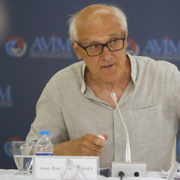
– Jeremy Salt taught at the University of Melbourne, at Bosporus University in Istanbul and Bilkent University in Ankara for many years, specializing in the modern history of the Middle East. Among his recent publications is his 2008 book, The Unmaking of the Middle East. A History of Western Disorder in Arab Lands (University of California Press) and The Last Ottoman Wars. The Human Cost 1877-1923 (University of Utah Press, 2019). He contributed this article to The Palestine Chronicle.



